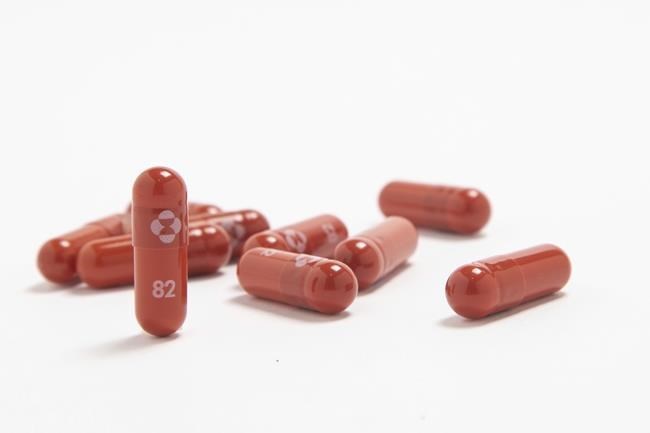WASHINGTON (AP) — In a potential leap forward in the global fight against the pandemic, drugmaker Merck said Friday that its experimental pill for people sick with COVID-19 reduced hospitalizations and deaths by half.
If cleared by regulators, it would be the first pill shown to treat COVID-19, adding a whole new, easy-to-use weapon to an arsenal that already includes the vaccine.
The company said it will soon ask health officials in the U.S. and around the world to authorize the pill’s use. A decision from the U.S. Food and Drug Administration could come within weeks after that, and the drug, if it gets the OK, could be distributed quickly soon afterward.
All other COVID-19 treatments now authorized in the U.S. require an IV or injection. A pill taken at home, by contrast, would ease pressure on hospitals and could also help curb outbreaks in poorer and more remote corners of the world that don’t have access to the more expensive infusion therapies.
“This would allow us to treat many more people much more quickly and, we trust, much less expensively,” said Dr. William Schaffner, an infectious disease expert at Vanderbilt University who was not involved in the research.
Merck and its partner Ridgeback Biotherapeutics said early results showed patients who received the drug, molnupiravir, within five days of COVID-19 symptoms had about half the rate of hospitalization and death as those who received a dummy pill.
The study tracked 775 adults with mild-to-moderate COVID-19 who were considered high risk for severe disease because of health problems such as obesity, diabetes or heart disease. The results have not been reviewed by outside experts, the usual procedure for vetting new medical research.
Among patients taking molnupiravir, 7.3% were either hospitalized or died at the end of 30 days, compared with 14.1% of those getting the dummy pill. After that time period, there were no deaths among those who received the drug, compared with eight in the placebo group, according to Merck.
The results were so strong that an independent group of medical experts monitoring the trial recommended stopping it early.
Company executives said they plan to submit the data to the FDA in the coming days.
Even with the news of a potentially effective new treatment, experts stressed the importance of vaccines for controlling the pandemic, given that they help prevent transmission and also reduce the severity of illness in those who do get infected.
White House coronavirus coordinator Jeff Zients said that vaccination will remain the government’s main strategy for controlling the pandemic. “We want to prevent infections, not just wait to treat them when they happen,” he said.
Dr. Anthony Fauci, the government's foremost authority on infectious diseases, called the results from Merck “very good news.”
Merck only studied its drug in people who were not vaccinated. But FDA regulators may consider authorizing it for broader use in vaccinated patients who get breakthrough COVID-19 symptoms.
Andrew Pekosz of Johns Hopkins University predicted vaccines and antiviral drugs would ultimately be used together to protect against the worst effects of COVID-19.
“These shouldn’t be seen as replacements for vaccination — the two should be seen as two strategies that can be used together to significantly reduce severe disease,” said Pekosz, a virology specialist.
Patients take four pills of molnupiravir twice a day for five days. Side effects were reported by both groups in the Merck trial, but they were slightly more common among those who received a dummy pill. The company did not specify the problems.
Earlier study results showed the drug did not benefit patients who were already hospitalized with severe disease. That's not surprising, given that antiviral drugs are most effective when used before the virus ramps up in the body.
The U.S. has approved one antiviral drug, remdesivir, for COVID-19, and allowed emergency use of three antibody therapies that help the immune system fight the virus. But all the drugs are expensive and have to given by IV or injection at hospitals or clinics, and supplies have been stretched by the latest surge of the delta variant.
The antibody drugs have been shown to reduce hospitalization and death by roughly 70% when given to high-risk patients, roughly 20 percentage points more than Merck's pill. But experts cautioned against comparing results from the two, given the preliminary nature of Merck's data.
Health experts, including Fauci, have long called for a convenient pill that patients could take when COVID-19 symptoms first appear, much the way Tamiflu is given to help speed recovery from the flu.
Like other antivirals, Merck’s pill works by interfering with the virus's ability to copy its genetic code and reproduce itself.
The U.S. government has committed to purchasing enough pills to treat 1.7 million people, assuming the FDA authorizes the drug. Merck said it can produce pills for 10 million patients by the end of the year and has contracts with governments worldwide. The company has not announced prices.
Several other companies, including Pfizer and Roche, are studying similar drugs and could report results in the coming weeks and months.
Merck had planned to enroll more than 1,500 patients in its late-stage trial before the independent board stopped it early. The results reported Friday included patients across Latin America, Europe and Africa. Executives estimated 10% of patients studied were from the U.S.
___
This story has been updated to correct that patients take eight pills per day, not two.
___
The Associated Press Health and Science Department receives support from the Howard Hughes Medical Institute’s Department of Science Education. The AP is solely responsible for all content.
Matthew Perrone, The Associated Press

